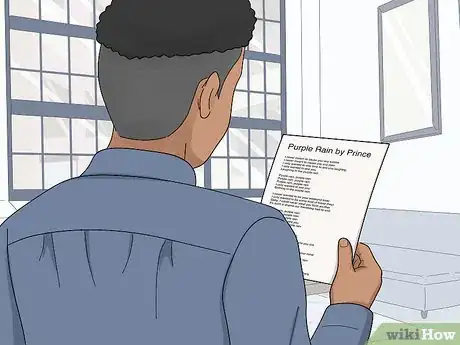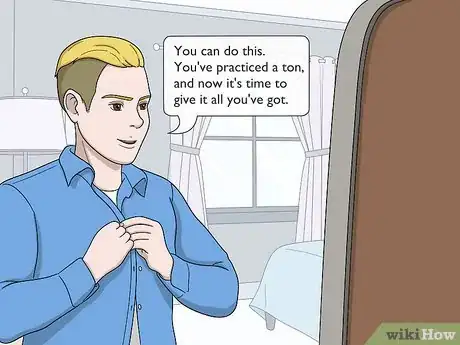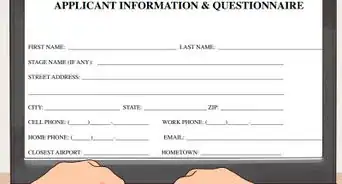This article was co-authored by Tanisha Hall. Tanisha Hall is a Vocal Coach and the Founder and Executive Director of White Hall Arts Academy, Inc. an organization based in Los Angeles, California that offers a multi-level curriculum focused on fundamental skills, technique, composition, theory, artistry, and performance at a conservatory level. Ms. Hall's current and previous students include Galimatias, Sanai Victoria, Ant Clemons, and Paloma Ford. She earned a BA in Music from the Berklee College of Music in 1998 and was a recipient of the Music Business Management Achievement Award.
There are 14 references cited in this article, which can be found at the bottom of the page.
wikiHow marks an article as reader-approved once it receives enough positive feedback. In this case, 91% of readers who voted found the article helpful, earning it our reader-approved status.
This article has been viewed 87,678 times.
Singing competitions are both exciting and nerve-wracking. To improve your chances at winning one, you’ll need to pick a great song, practice as much as you can, and use confident body language to make the audience feel more engaged. Taking care of your body and adopting a positive mindset can also get you ready to give a killer performance.
Steps
Choosing a Song
-
1Pick a song that’s appropriate for your range and abilities. Choose a song that plays into your strengths and downplays your weaknesses. If you have an incredibly powerful voice, pick a bold, loud song. If you’ve got a killer range, pick a song that shows it off.[1]
- You’re better off choosing a simpler song that you can sing comfortably than a challenging song.
-
2Go for a lesser known song. To make yourself stand out, go for a more original song. Steer clear of the over-performed classics, unless you’re sure you can put a really unique spin on one.[2]Advertisement
-
3Choose an artist or song that is particularly meaningful to you. Do your research so you understand your artist’s style and history. Be ready to talk about your reasons for picking a particular song or artist in case the judges ask.[3]
- Avoid giving cliche reasons for picking your artist. Try to find an original perspective.
Working on the Basics
-
1Take singing lessons or watch online tutorials. Make sure you have a good foundation before you start practicing your performance piece. If you can, you should get a vocal coach to work through the basics with you. If not, you can find tons of tutorials online.
-
2Practice breath control. Breath control is one of the most important skills a singer can have. Practice exhaling slowly from your diaphragm, which is the muscle under your ribs, alternating between “ooh” and “ahh” sounds. Notice how you can use your diaphragm to create different amounts of tension in your breath.[4]
- Your lower abdomen should expand as you inhale and contract as you exhale.
-
3Perfect your pitch. Play notes on an instrument, like a piano or guitar. Try to match the notes with your voice.[5]
- If you don’t have an instrument on hand, try using an online keyboard.
-
4Practice good singing posture. Good posture allows for the proper flow of breath, which makes for skillful singing. Stand with your feet shoulder-width apart and your arms relaxed at your sides. Keep your chin parallel to the floor, your chest out, and your shoulders back.[6]
- Lean forward a little bit, and keep your abdomen tight but expandable.
-
5Do a thorough warm up before you sing. Just like your muscles, you need to warm up your voice before you put it to work. You should warm up before every practice session. If you have a vocal coach, they’ll probably give you warm up exercises. You can also check out online singing tutorials.[7]
- You should always begin your warm up with breath activation exercises, like hissing or trills. Then, do some scales that stretch your range. Finally, if you have time, you should work on improving techniques or skills that give you a little trouble.
Practicing Your Song
-
1Practice your song until you’re comfortable with the melody and lyrics. Then, practice some more! The more comfortable you are with the song, the more likely you’ll rock your performance at the competition. Ideally, each session should include 20 minutes of warm up, 20 minutes of song work, and 20 minutes of different vocal techniques.[8]
- When you’re working on your song, start by learning the rhythm, melody, and lyrics. Once you know the lyrics and melody by heart, work on mastering the song’s vocal style and putting your own unique spin on it.
-
2Record your performance and critique it. Sing in front of your webcam, or take a recording on your phone. Then, listen and watch carefully. You may be able to pick up on weaknesses in your voice and movement that you didn’t notice before. Target problem areas with extra practice.[9]
- Performing in front of a mirror can be super helpful as well.
-
3Perform your song in front of as many people as you can. Once you know your song in and out, perform for friends and family members as often as possible. It’ll help re-create that competition environment, giving you a chance to hone your performance skills and practice managing your performance jitters.[10]
- Listen to their critiques without taking them personally. If they tell you you’re too stiff, don’t get defensive. Realize that they want to help you, and focus on loosening up a bit during your performance.
-
4Increase your practicing volume two weeks before the competition. Your voice is like a muscle, so you need to make sure it’s nice and strong before the competition. Try to practice a little more in the two weeks before you’re set to compete. Of course, you shouldn't go crazy with practicing, because you don’t want to exhaust your voice. [11]
- Remember, it’s better to do a little practicing every day than one huge practice session once a week.[12]
-
5Look at other performances to improve your own. YouTube is a great source for performance videos--there are literally millions out there. Look at performances specific to your genre or song. You may even be able to find past performances from your competition!
- Watch one of your favorite performances while looking in a mirror. Mimic the performer to improve your performance style.
Taking Care of Your Body and Voice
-
1Get enough sleep each night the week before. Being well rested will help you feel alert and fresh on competition day. Teens should get at least eight hours each night, and adults should get at least seven.[13]
- Try to go to bed at the same time each night and wake up at the same time each morning.
- Avoid caffeine, alcohol, and sugary foods right before bed.
-
2Stay hydrated. Hydration is key for a great performance. Start hydrating the week before your competition. You should aim for eight glasses a day. Carrying a refillable water bottle with you can make it easier to stay hydrated.[14]
- Stick to water. Avoid sugary beverages like juice and soda.
-
3Avoid eating the hour before you sing in the competition. Food plus pre-competition nerves can create troublesome stomach issues. Make sure you eat earlier in the day, because you need to be fueled up to give an awesome performance.[15]
- Avoid sugary foods and caffeine on competition day. These can increase your anxiety.[16]
- Steer clear of alcohol, spicy foods, and citrus, which can cause acid reflux.[17]
- Keep away from dairy products before you compete, like cheese, milk, and yogurt. These can thicken the phlegm in your throat.[18]
-
4Warm up your voice twice on competition day. Do an hour long warm up the morning of your competition. Do a shorter warm up 30 minutes before you compete.[19]
- You should come up with a warm up ritual, either on your own or with your vocal coach. YouTube can be a great source for warm up ideas.
Getting in a Positive Mindset
-
1Use positive self-talk on competition day. Positive self talk means talking to yourself using kind and encouraging words. Think of it as a pre-competition pep talk! If you feel negative thoughts creeping in, combat them with positive ones.[20]
- If you find yourself thinking, “I’m going to mess up,” tell yourself, “You can do this. You’ve practiced a ton, and now it’s time to give it all you’ve got.”
-
2Find phrases or images that make you feel optimistic. Have a few go-to phrases or images that make you feel confident and ready to perform. Hold them in your mind before you compete.[21]
- You might have a phrase like, “Time to crush it,” or visualize yourself winning the competition.
-
3Don’t think of this competition as your one and only chance. Thinking that way will only make you more nervous. Instead, think of this competition as an opportunity to improve your skills and get outside of your comfort zone. If you have a stellar performance, great! If not, you’ll have more opportunities in the future.[22]
-
4Focus on the potential for success instead of failure. Don’t drive yourself crazy worrying about what could go wrong. Instead, think about what could go right. Imagine the audience cheering for you after an awesome performance.[23]
- Put your energy into providing a good show for the audience rather than worrying about what they’re thinking.
Giving a Great Performance
-
1Make eye contact with the audience. Looking at the floor or darting your eyes around the room will make you look less confident, which will detract from your performance. Hold steady eye contact with the audience. You’ll look fearless, composed, and confident.[24]
-
2Move around the stage with confidence. For most competitions, you should walk around as you sing to make your performance more dynamic. Don’t hesitate or stop mid-walk, or you’ll seem unsure of yourself.[25]
- Make sure you come to the front of the stage from time to time throughout your performance. It’ll help you connect with your audience.[26]
-
3Stand up straight. Good posture can take your performance to the next level. Keep your back straight, your shoulders back, and your head held high. You’ll give off tons of confidence, which is key for a fantastic performance. Plus, good posture is important for high quality singing.[27]
-
4Use big, relaxed gestures to enhance your performance. If you want to use your arms to gesture as you sing, don’t keep them locked at your sides or use tiny movements--you’ll look stiff and timid. Instead, go for big, sweeping gestures. Extend your arms all the way out. “T-rex arms” that are stiff at the elbow are a big no-no.[28]
- Gestures are especially important if you’re not moving around much during your performance.[29]
-
5Use facial expressions that fit with the emotion of your song. If you’re singing a sad romantic ballad, a gentle, sorrowful expression can give your song a bigger emotional impact. Beware of going overboard with exaggerated smiles and frowns, though. Keep your facial expressions natural and authentic.[30]
-
6Remember that the judges are your audience, too. Treat the judges like you would any other member of the audience. For a more authentic performance, try to sing for them instead of to them.[31]
- The judges aren’t evil masterminds out to get you. They actually want you to do well!
Expert Q&A
-
QuestionHow can I make my voice stronger and clear?
 Tanisha HallTanisha Hall is a Vocal Coach and the Founder and Executive Director of White Hall Arts Academy, Inc. an organization based in Los Angeles, California that offers a multi-level curriculum focused on fundamental skills, technique, composition, theory, artistry, and performance at a conservatory level. Ms. Hall's current and previous students include Galimatias, Sanai Victoria, Ant Clemons, and Paloma Ford. She earned a BA in Music from the Berklee College of Music in 1998 and was a recipient of the Music Business Management Achievement Award.
Tanisha HallTanisha Hall is a Vocal Coach and the Founder and Executive Director of White Hall Arts Academy, Inc. an organization based in Los Angeles, California that offers a multi-level curriculum focused on fundamental skills, technique, composition, theory, artistry, and performance at a conservatory level. Ms. Hall's current and previous students include Galimatias, Sanai Victoria, Ant Clemons, and Paloma Ford. She earned a BA in Music from the Berklee College of Music in 1998 and was a recipient of the Music Business Management Achievement Award.
Vocal Coach Practice singing in low-pressure situations as much as you can so you feel more prepared for your performance.
Practice singing in low-pressure situations as much as you can so you feel more prepared for your performance. -
QuestionWhat do judges look for in a singing competition?
 Tanisha HallTanisha Hall is a Vocal Coach and the Founder and Executive Director of White Hall Arts Academy, Inc. an organization based in Los Angeles, California that offers a multi-level curriculum focused on fundamental skills, technique, composition, theory, artistry, and performance at a conservatory level. Ms. Hall's current and previous students include Galimatias, Sanai Victoria, Ant Clemons, and Paloma Ford. She earned a BA in Music from the Berklee College of Music in 1998 and was a recipient of the Music Business Management Achievement Award.
Tanisha HallTanisha Hall is a Vocal Coach and the Founder and Executive Director of White Hall Arts Academy, Inc. an organization based in Los Angeles, California that offers a multi-level curriculum focused on fundamental skills, technique, composition, theory, artistry, and performance at a conservatory level. Ms. Hall's current and previous students include Galimatias, Sanai Victoria, Ant Clemons, and Paloma Ford. She earned a BA in Music from the Berklee College of Music in 1998 and was a recipient of the Music Business Management Achievement Award.
Vocal Coach Really connect with your music; after all, singing is storytelling. Focus on connecting with the words you're singing.
Really connect with your music; after all, singing is storytelling. Focus on connecting with the words you're singing. -
QuestionI'm auditioning for Britain's Got Talent but I'm only 11. How can I get into the finals at least?
 Community AnswerPractice! Practice! Practice! Just, like the old saying goes; "practice makes perfect." Make sure before the audition you get plenty of sleep and drink plenty of water. Most importantly, don't ever give up on your dream. If you don't succeed at first, try another competition. You're young, you have plenty of time.
Community AnswerPractice! Practice! Practice! Just, like the old saying goes; "practice makes perfect." Make sure before the audition you get plenty of sleep and drink plenty of water. Most importantly, don't ever give up on your dream. If you don't succeed at first, try another competition. You're young, you have plenty of time.
References
- ↑ https://kentamplinvocalacademy.com/how-to-win-singing-competitions/
- ↑ https://kentamplinvocalacademy.com/how-to-win-singing-competitions/
- ↑ https://kentamplinvocalacademy.com/how-to-win-singing-competitions/
- ↑ https://www.vocaltips.net
- ↑ https://www.vocaltips.net
- ↑ http://takelessons.com/blog/singing-posture
- ↑ http://blog.stageagent.com/how-to-warm-up-before-singing/
- ↑ http://takelessons.com/blog/singing-practice-routine-z02
- ↑ https://kentamplinvocalacademy.com/how-to-win-singing-competitions/
- ↑ https://kentamplinvocalacademy.com/how-to-win-singing-competitions/
- ↑ http://blog.sonicbids.com/how-to-prep-your-voice-for-your-next-big-show-a-three-week-guide
- ↑ http://blog.stageagent.com/how-to-warm-up-before-singing/
- ↑ https://www.helpguide.org/articles/sleep/sleep-needs-get-the-sleep-you-need.htm
- ↑ http://blog.sonicbids.com/how-to-prep-your-voice-for-your-next-big-show-a-three-week-guide
- ↑ https://kentamplinvocalacademy.com/how-to-win-singing-competitions/
- ↑ http://www.webmd.com/anxiety-panic/guide/stage-fright-performance-anxiety#1
- ↑ https://www.caricole.com/performance-tips/
- ↑ https://www.caricole.com/performance-tips/
- ↑ http://blog.sonicbids.com/how-to-prep-your-voice-for-your-next-big-show-a-three-week-guide
- ↑ https://www.psychologytoday.com/blog/hope-relationships/201605/the-power-positive-self-talk
- ↑ http://blog.stageagent.com/how-to-warm-up-before-singing/
- ↑ https://kentamplinvocalacademy.com/how-to-win-singing-competitions/
- ↑ http://www.webmd.com/anxiety-panic/guide/stage-fright-performance-anxiety#1
- ↑ http://www.askavocalcoach.com/singing-performance-tips/
- ↑ http://www.askavocalcoach.com/singing-performance-tips/
- ↑ http://www.openmicuk.co.uk/advice-for-unsigned-singers/stage-performance-tips-for-singers#.WZRrPjYqteA
- ↑ http://www.askavocalcoach.com/singing-performance-tips/
- ↑ http://www.askavocalcoach.com/singing-performance-tips/
- ↑ http://www.openmicuk.co.uk/advice-for-unsigned-singers/stage-performance-tips-for-singers#.WZRrPjYqteA
- ↑ http://www.openmicuk.co.uk/advice-for-unsigned-singers/stage-performance-tips-for-singers#.WZRrPjYqteA
- ↑ http://takelessons.com/blog/singing-contests-z02
- ↑ Tanisha Hall. Vocal Coach. Expert Interview. 27 March 2020.























































































